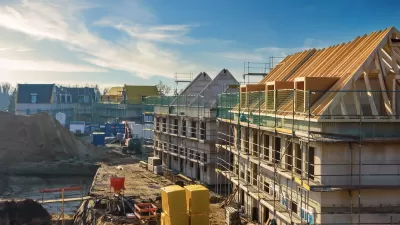Although it is widely seen as a national issue, decisions made at the local level often have a stronger impact on inflation than federal policies.

While it may be easy to blame the federal government for rising inflation, Alex Yablon, writing in Vox, argues that “many of the worst bottlenecks making the pandemic economic recovery so painful were put in place by political actors much lower down the food chain, from governors to city councilors to everyday citizens.”
“State and local jurisdictions, not the Fed or the feds, determine how much housing is built and where, when to permit cheap clean energy sources and vital energy transmission lines, and whether to expand ports and logistics infrastructure. Across the country, local legislators, executives, and public authorities have declined to spend more to improve economic capacity, or placed additional hurdles in the way of badly needed new development.”
Yablon outlines three areas where local governments have exacerbated the situation, as well as suggestions for how to reverse the negative impacts: energy and transportation, where local officials can support the transition to renewable energy; housing, where local decisionmaking about zoning and land use affect supply; and logistics infrastructure, which is often controversial at the local level. Too often, major infrastructure projects cross multiple jurisdictions and agencies with competing interests and priorities. As Yablon writes, “These efforts require a level of coordination and prioritization policymakers haven’t practiced in decades.”
FULL STORY: Mad about inflation? Blame your local officials.

Alabama: Trump Terminates Settlements for Black Communities Harmed By Raw Sewage
Trump deemed the landmark civil rights agreement “illegal DEI and environmental justice policy.”

Study: Maui’s Plan to Convert Vacation Rentals to Long-Term Housing Could Cause Nearly $1 Billion Economic Loss
The plan would reduce visitor accommodation by 25% resulting in 1,900 jobs lost.

Planetizen Federal Action Tracker
A weekly monitor of how Trump’s orders and actions are impacting planners and planning in America.

Waymo Gets Permission to Map SF’s Market Street
If allowed to operate on the traffic-restricted street, Waymo’s autonomous taxis would have a leg up over ride-hailing competitors — and counter the city’s efforts to grow bike and pedestrian on the thoroughfare.

Parklet Symposium Highlights the Success of Shared Spaces
Parklets got a boost during the Covid-19 pandemic, when the concept was translated to outdoor dining programs that offered restaurants a lifeline during the shutdown.

Federal Homelessness Agency Places Entire Staff on Leave
The U.S. Interagency Council on Homelessness is the only federal agency dedicated to preventing and ending homelessness.
Urban Design for Planners 1: Software Tools
This six-course series explores essential urban design concepts using open source software and equips planners with the tools they need to participate fully in the urban design process.
Planning for Universal Design
Learn the tools for implementing Universal Design in planning regulations.
Caltrans
Smith Gee Studio
Institute for Housing and Urban Development Studies (IHS)
City of Grandview
Harvard GSD Executive Education
Toledo-Lucas County Plan Commissions
Salt Lake City
NYU Wagner Graduate School of Public Service





























